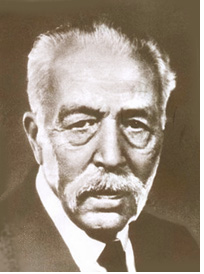...Best of Sicily presents... Best of Sicily Magazine. ... Dedicated to Sicilian art, culture, history, people, places and all things Sicilian. |
by Michele Parisi | ||
Magazine Index Best of Sicily Arts & Culture Fashion Food & Wine History & Society About Us Travel Faqs Contact Map of Sicily |
• elitism - 1. The belief that certain persons or members of certain classes or groups deserve favoured treatment by virtue of their perceived superiority, as in intellect, social status, or financial resources. 2. The sense of entitlement enjoyed by such a group or class. That definition has no monopoly on accuracy but it is a good starting point. Few outside the realm of scholarly sociology realise that some of the more important insights into what we now call elitism were advanced by a Sicilian named Gaetano Mosca. Born in Palermo in 1858, Mosca lived much of his life in Rome, where he worked as a journalist and then became a member of the Chamber of Deputies. His degree was in law, and he occasionally taught at the universities of Palermo and Rome before becoming chairman of constitutional law at the University of Turin in 1896. When he was elected to parliament in 1909, Mosca was already prominent in his field. He also contributed to several newspapers as a political journalist. From 1914 until 1916, Mosca was Associate Minister for the Colonies. In 1919, he was made a life senator. In 1926, disgusted with what was evolving into a Fascist dictatorship, he retired from public life to dedicate his time to teaching and research. To call him an "anti-Fascist" would be an overstatement, but Mosca was known to disagree violently with many Fascist policies. An interesting question would be whether he saw his theories of ruling classes reflected in Italy's colonialist adventures, which he helped to oversee for a short time in the years immediately following the Italian occupation of Libya. With other political scientists, Gaetano Mosca is credited with developing the Theory of Elitism, and much of his work overlapped the fields of political science and what is now sociology. His Theory of Governments, published in 1884, is a landmark work. The Ruling Class, published in 1896, was equally important, and is much cited by those studying aristocracies. Indeed, it is probably the most influential of his books. His last major work was the History of Political Doctrines, published in 1936. Mosca's most enduring contribution to the field of political science is his timeless observation that all except the most primitive societies are, in practice, ruled by a numerical minority, for which he coined the term "political class." This theory came to be known as "elitism," but it differs from subsequent theories formulated by (for example) C. Wright Mills, author of The Power Elite, published in 1956. Mosca, unlike Mills and others, sought to develop a truly universal theory of political society, a kind of "universal field theory" that transcended some of the ideas of Marx and others. One could argue, of course, that Plato's Republic is the inspiration for much political philosophy. Essentially, Mosca defined the modern elites of industrialised societies in terms of their superior organisation. Organisational skills were necessary to establish political dominance in modern society. Mosca's theory was viewed as being more "liberal" than those of his contemporary colleagues, such as Vilfredo Pareto. According to Mosca, elites are not intrinsically hereditary (as aristocracies often are), and people from virtually any class of society can, at least in theory, become part of the elite. Furthermore, he subscribed to the concept of a "circulation of elites," namely a continuing competition among potential elites, with one group occasionally replacing another. Gaetano Mosca died in Rome in 1941. About the Author: Michele Parisi, who presently resides in Rome, has written for various magazines and newspapers in Italy, France and the United Kingdom. | |
Top of Page |
 Elitism is a popular topic of debate
nowadays, when anybody can agree on its definition. For the record:
Elitism is a popular topic of debate
nowadays, when anybody can agree on its definition. For the record: